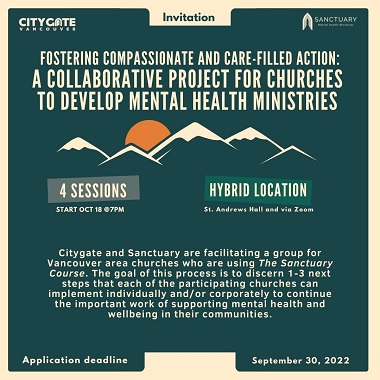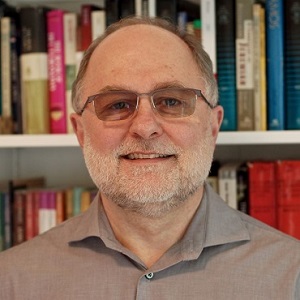 Creating Conversation is a weekly editorial, curated by the Centre for Missional Leadership, that gives opportunity for people to speak about issues they believe are vital for the church in Vancouver.
Creating Conversation is a weekly editorial, curated by the Centre for Missional Leadership, that gives opportunity for people to speak about issues they believe are vital for the church in Vancouver.
One of the goals of this weekly article is to spark dialogue – and action.
We invite you to join the dialogue here on the Church for Vancouver website. We also invite you to use the article as a discussion starter with your small group, church staff, friends and your neighbours. Thanks for participating in the conversation!
One of the recurring conversations I have had with people over the pandemic has to do with mental health. While for some, Covid has been more of a dent in their schedule than a disfiguration, that is not true for others.
My spouse, Mary, works in an older adults’ residence. Although the staff demonstrated creative care, going the extra mile in every way, many residents nonetheless experienced the heaviness of pandemic isolation. Incidences of depression rose.
In Vancouver, where social isolation had already been identified as a key social reality a decade ago, this was disastrous.
And given that we live in what sociologist Harmut Rosa has described as an “accelerated” society that requires “constant economic growth, technological acceleration and cultural innovation in order to maintain the status quo,”1 is it any wonder that mental health is precarious?
For those on the ‘losing’ side of a capitalist economy, this reality runs even deeper. During a seminar we held at our church over 20 years ago on mental health, more than 50 percent of the folks attending put up their hand when we asked if they or someone in their immediate family was dealing with mental illness. Clearly, it’s time for us to be talking about mental health.
The Sanctuary Course
To that end, I am grateful for The Sanctuary Course on mental health. The Sanctuary Course was created to inspire and equip communities of faith to understand the issues of mental health so that churches might be supportive, safe places for all people.
Developed in consultation with mental health professionals, theologians and people with lived experience, the eight-session course explores key mental health topics and examines meaningful ways to accompany those facing mental health challenges.
When I took the course, I found that it reduced stigma, opened up conversation and fostered both understanding and deep empathy.
Society is talking more about mental health and some sectors of the church need to catch up. If you or others from your church haven’t taken the course, I highly recommend it. If your church has not been talking much about mental health, this course can catalyze the dialogue.
Community Development Response
Now we have an additional opportunity. Churches around the Vancouver area are being invited to apply to participate in a collaborative ‘Community Development Response’ to the Sanctuary course.
Together Sanctuary and Citygate will work with up to 10 churches in this pilot project to foster a collective plan that increases our capacity to respond holistically and effectively to persons facing mental health challenges.
The goal of this process is to discern one to three next steps that each of the participating churches can implement individually and/or corporately to continue the important work of supporting mental health and well-being in their communities.
This is a pilot project; our hope is that this process will then be made available to other cities so that the churches around the world may better come alongside each other in our human journey toward mental health. For more information on how to apply for the Community Development Response program (four Tuesday mornings, October 25 – April 11), go here
At a time when many of us feel like our capacity has waned, working collaboratively can spark new energy for a response that is desperately needed in our city.
As sociologist Robert Bellah was fond of declaring, it only takes two percent of a group/society to catalyze change. Perhaps you can grab three to five other people in your church who have taken the course or who are willing to take it and apply together to share in this project. It’s not only time to talk about mental health; it’s time to respond with compassion and care.
Update: Strathcona Church
Three months ago, I wrote an article challenging the church to reimagine its use of buildings and property which you can access here.
One of the creative examples I mentioned was the Strathcona Church that Marion Man purchased eight years ago with the hope of making that building available to groups seeking the well-being of that neighbourhood as part of God’s mission.
That church building has more spaces and times available right now. If your group is committed to the well-being of Strathcona and needs space, check out their website or contact me at tim@citygatevancouver.org. I would be delighted to answer your questions and help you get connected there.
1 Harmut Rosa, The Uncontrollability of the World, (Polity Press, Cambridge, 2020), p. 6.

Tim Dickau
Tim Dickau is director of CityGate Vancouver and leader of the Certificate in Missional Leadership with the Centre for Missional Leadership at St. Andrews Hall on the UBC campus.
(The next certificate cohort begins September 25, running for four Saturdays, every two months, until March 25, 2023. The registration deadline is September 18.)
He is the author of Plunging into the Kingdom Way and Forming Christian Community in a Secular Age: Recovering Humility and Hope.
